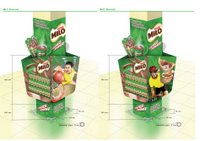Have you seen the famous book of “Idiot’s for Math” or “Idiot’s for Marketing”?. I believe yes! but how about “Idiot’s for Ramadhan”. Eh, ternyata ada juga. Konyol banget terutama pada saat dialog:
~ “I heard you can't have sex in Ramadhan, is this true?”
~ “What about all that bowing 'yo-yo' stuff?
~ “When you kiss the ground and things?”
Benar-benar idiot question! anyway bagus juga buat yg belum tahu apa itu Ramadhan dalam artian umum. Penasaran khan ? simak saja….
An Idiot's Guide to Ramadhan
Ramadhan, what the heck is that?
Ramadhan is the 9th month of the Islamic calendar. It's when Muslims all over the world spend 30 days observing fast and bettering themselves in principles of faith.
Observing fast? Is that something to do with running, then?
No.
Oh, it must be driving, huh? You know, I can drive really fast, I've got an Escort...
Er...no.
Oh, what is it then?
Observing fast, or fasting, is when a person abstains (or keeps away) from eating and drinking.
What, you don't eat or drink anything? Don't you get hungry? I know I would.
Yes, that's the idea. We fast for 30 consecutive days during the month of Ramadhan.
30 days? Are you mad? No one can go 30 days without food and drink!
No, that's right, which is why Muslims only fast during daylight hours. Once the fast for each day ends, they are allowed to eat again.
Then, what's the point of fasting?
The reason Muslims fast is to discipline their body and mind. The absence of food and drink and other pleasures provides a perfect opportunity to concentrate on prayer and worship. Not having the luxuries of life to hand makes it easier to reflect on life and be grateful for what we do have. Muslims use this month to start afresh and give their life a new direction?
What kind of direction?
Many Muslims use Ramadhan to make resolutions, similar to New Year's resolutions. It is a time when they decide how they want to live their life for the next year and try their very best to adhere to their new commitments.
Commitments...?
Yes, like greater commitment to God and faith. Ramadhan is a time when Muslims can introduce practices into their life to reflect their religious identity. A lot of Muslims have a desire to pray more and learn more about Islam. Others wish to be better and nicer people while some want to learn Qur'anic Arabic to better their understanding of the Holy Book. For these people, Ramadhan is the best opportunity to begin this grand affair with something so personal and spiritually enlightening.
Can't they do it at any other time... why Ramadhan?
Ramadhan is a blessed month ordained by God. It is the month in which Satan
and his minions are said to be locked away in Hell to prevent them from misleading, deceiving and whispering in the ears of believers.
This doesn't mean that sin and bad deeds will completely disappear for a month but it
will mean that if bad deeds are done and sins committed, they will be from the hearts of people alone and the devil cannot be blamed.
However, God has promised the people that the reward for good deeds and actions during the holy month will be multiplied greater than usual and this encourages many to increase their level of worship and prayer. Although, this also applies to sins and so any naughty actions only invite greater punishment than usual.
Ramadhan does make it easier for Muslims to observe their faith though, largely because all Muslims are following the same pattern and so they are always offering each other moral support and encouraging each other to do better. Ramamdhan brings people much closer than normal as they forgive each other for any misdemeanours of the past, forge new and positive relationships and treat each other with greater respect.
What else do Muslims do in Ramadhan?
Well, aside from fasting, they pray more. Muslims should pray five times a day anyway and go to the mosque but many find this difficult so Ramadhan helps them to fulfill these practices and in many cases, stick to them long after Ramadhan is over. Muslims also read the Qur'an more and understand and share their religious teachings. They also learn to abstain from bad habits and minor and major sins and hopefully continue with the effort when Ramamdhan is over too.
What kind of bad habits are we talking about, like picking yer nose?
Well, that could be one. Many people are always trying to give up things that they know are bad for them or things that make God angry. These are usually things that are not good for people and not good for those around them and so people use Ramadhan as the time to drop these ills. It is debatable as to what is considered a bad habit or deed but because Ramadhan is observed as a religious obligation, most use religious teachings to determine what is right and what is wrong.
So, what's the really bad stuff then?
A number of things. Practices like smoking, swearing, drinking alcohol and abusing drugs, treating people with disrespect and being mean, harming or hurting living things, being cruel, un-courteous and selfish. There's a whole host of things, many of them universally accepted as 'unhealthy'.
I heard you can't have sex in Ramadhan, is this true?
Sex is allowed in Ramadhan but not during the fast. Just like food and drink, a person's natural needs must be fulfilled. Muslims are normally allowed to eat, drink and have sexual relations so this would be the case in Ramadhan but not during the fast when all must be avoided or they could nulify the fast. When the fast is over for the day, those things that are halal (lawful) may continue but more time should still be spent on worship.
However, Islam doesn't allow extra-marital relationships so any sexual activity outside of marriage or contrary to Islamic teaching is prohibited and those who may indulge in any such activity are expected to try their very best in Ramadhan to abstain with
intent to give up - the same applies to any haraam (prohibited) activities
as mentioned before.
What about all that bowing 'yo-yo' stuff?
You what?
When you kiss the ground and things?
I think you're referring to prayer. Muslims don't kiss the ground, they prostrate to the Lord in submission. As I mentioned, Muslims must try to improve and excel in their prayer during the holy month, with extra effort on the regular prayers during the day, not just Friday services. Both Muslim men and women should make more effort to go the mosque and spend more time studying Islamic knowledge and the Qur'an.
Attending lectures and being involved in good work, whether it's helping out at the old folk's home or even attending a peace rally, all is encouraged. During Ramadhan, there are special prayers known as the 'Tarawih' service which are performed every
evening at the mosque in congregation.
When does the fast begin and end?
The fast begins just before dawn when Muslims eat a light meal (suhoor) and confirm their intention to fast for the day. The fast ends at sunset when the call to prayer (Adhan) is announced. Eating a date or some water are the recommended and most popular methods of concluding the fast. The time when the fast ends is known as 'Iftar'.
When you break the fast, do you have to eat Asian food?
Because Islam is not a culture, there is no restriction on what is eaten by Muslims provided it is prepared in the halal manner. Quite obviously, pork and alcohol are not allowed. Recommended food items for Muslims include dates, milk, water, honey, olives and figs - all for their nutritional properties and religious significance. With regards to main meals, anything from fish and chips and spag bol to curries and cous-cous is allowed.
Why do some people stuff themselves when the fast is over?
Those who are fasting should deprive themselves of the meals they would normally have during the times of fast but they shouldn't really eat all they missed once the fast is over as this defeats the whole objective of the fast. When breaking the fast (of having breakfast, I guess), they should simply have the meal they would on any other day. It is permissible to have a more elaborate feast if one if hosting a 'Iftar' meal for guests as this is considered a good and noble act, in which there is divine reward.
But don't you have to think about the poor?
Yes, Ramadhan is also about thinking about the less fortunate and needy although in a lesser degree to improving one's own character over the blessed month. Not eating and drinking does encourage Muslims do recognise how the poverty-stricken and starving people in the world must bear the burden of daily life and this is why, in Ramadhan, many Muslims donate more to charities and why mosques collect more so that people right across the world can have better life and those who donate can gain greater regard for well intentioned actions.
So who has to fast, is it everyone?
Not everyone. Young children are encouraged to learn about fasting but fasting is only obligatory (a must) for anyone beyond adolescence (or over the age of 10 according to some scholars). Muslims who have medical conditions that prevent or make fasting difficult, those who are not of sound mind or are going through a pregnancy or menstruation cycle as well as those who are too young or too old do not have to fast. In some circumstances, individuals who cannot fast for any number of reasons may make up the fast at a later date.
Some people call it 'Ramadam', what's that all about?
The month is correctly known as 'Ramadhan' or 'Ramadan', the latter being the more anglicised version. 'Ramadam' is incorrect and is mistakenly used. 'Ramadam-dam-dam', as pronounced by Ali G, is also wrong but you probably
guessed that already.


